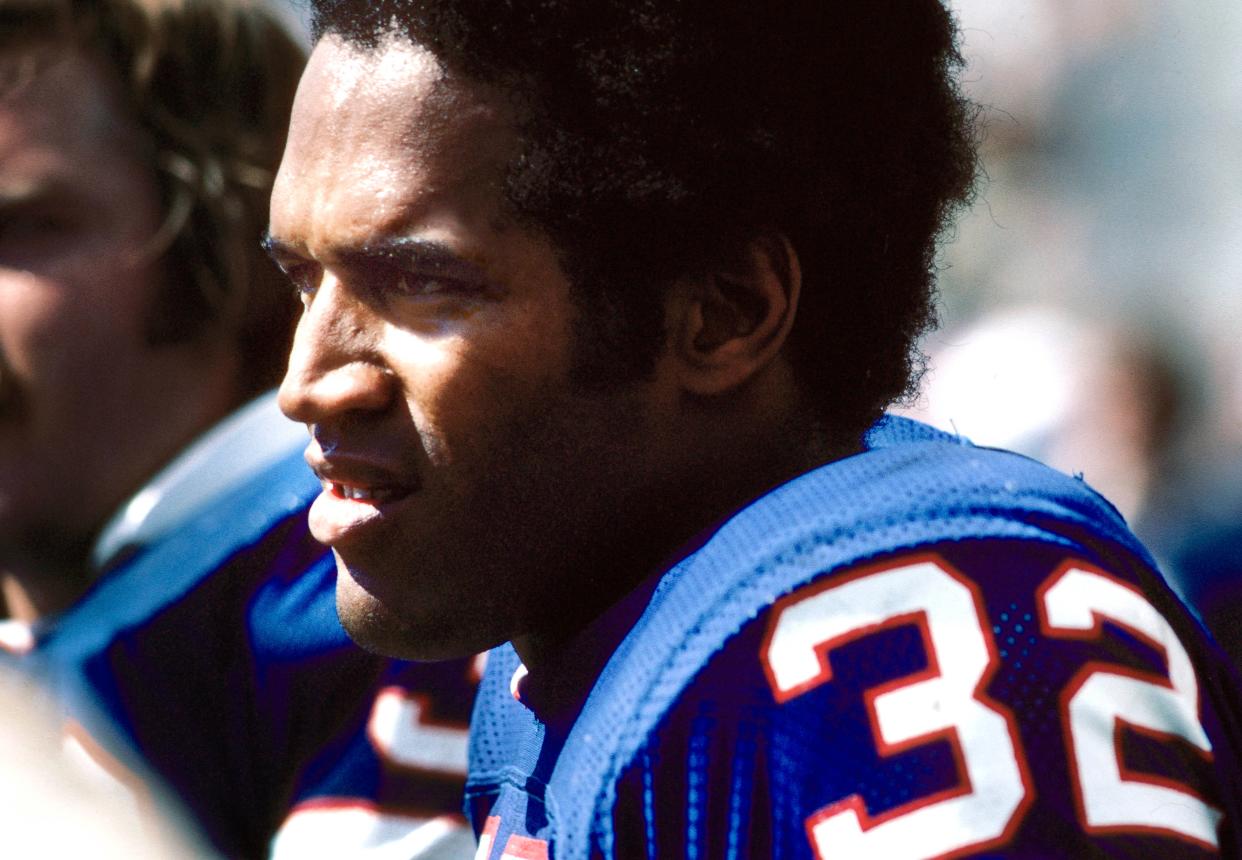Oller: Even decades later, O.J. Simpson offers lesson in idolizing superstar athletes
The most mesmerizing drive I ever witnessed was not on a football field but on a Los Angeles freeway, where a white Ford Bronco carrying O.J. Simpson became the first step in forever changing mass media and masses of minds.
Until that slow-rolling police chase along Interstate 405 on June 17, 1994, network television mostly cut away from regularly scheduled programming for NASA rocket launches, moon landings and Watergate. Afterward, 24/7 coverage of high-profile crime cases became the norm and reality TV soon overwhelmed the airwaves.
Until that chase, we still mostly trusted our sports stars to be the same person in real life as they were when swinging a bat or carrying a ball.

Simpson changed that. The former NFL star, who died Wednesday at age 76 after battling cancer, became a turning point in how we view sports icons. Before that ride in the Bronco and subsequent arrest on charges he murdered his ex-wife, Nicole Brown Simpson, and her friend. Ron Goldman, Simpson was a beloved former athlete who ranked among the most famous celebrities in the world.
If you can believe it, the “Juice” was even more ubiquitous through the 1970s and ’80s than Peyton Manning, Patrick Mahomes and LeBron James are today. Simpson won the 1968 Heisman Trophy as a tailback at Southern California, and with the Buffalo Bills he became the first running back in NFL history to surpass 2,000 yards in a season. Off the field, he starred in movies, Hertz rental car commercials and was in the booth for Monday Night Football broadcasts. Always charming, he seemed the last person who would be accused – and later acquitted, although found civilly liable – of killing two people.

A retired NFL writer once told me he spent a day hanging out with Simpson in the 1970s for a profile story and found him the most accommodating and gracious athlete he ever interviewed.
And truth be told we want to be duped, to surrender to the temptation of turning great athletes into good people. We choose to avoid the sharp corners and rough edges of reality, or as author C.S. Lewis described it, we want the kind of dream furniture on which you never stub your toes or bang your knee. We know we should separate the performer from the person, but doing so is difficult.
Or at least it was, until Simpson rubbed the sheen off our naivete.
Trial exposed racial divide
“Not guilty.”
With those two words, a scar ripped open, exposing a wound that some thought had healed decades earlier.
Before the Bronco ride and Simpson trial, many white Americans thought race relations had improved in the U.S., and in some ways, that was true. Black people were not getting sprayed with fire hoses and attacked by police dogs; they could drink from the same water fountains as whites. The beating of Rodney King by Los Angeles police in 1991 was a wake-up call. But white America quickly hit the snooze button.
Then came the “Free O.J.” signs draped across L.A. overpasses, followed by the recordings of racist cop Mark Fuhrman revealed during court proceedings, and finally the celebration by many Black Americans and exasperation among many whites after Simpson was found not guilty.
Right before the verdict was reached on Oct. 3, 1995, I stared out the window of my hotel overlooking the Los Angeles Superior Courtroom where the trial was being held. The Cincinnati Reds were in L.A. to play the Dodgers in the 1995 National League playoffs. I counted more than 20 TV trucks parked at the ready. It was hot outside. I worried it was about to get hotter.
Instead, things cooled rapidly. Was O.J. innocent? Was justice served? Maybe not, but in the minds of many, a Black man had finally gotten over on the man.
The eyes of the naive opened that day. Sports fans became more cynical. Innocence took a hit. The words of Mark Twain proved true: “Everyone is a moon and has a dark side which he never shows to anybody.”
That dark side emerged again when on Oct 3, 2008, 13 years to the day after Mr. Simpson's acquittal in the double-murder case, a jury convicted Simpson of 10 counts of armed robbery, kidnapping and conspiracy, resulting in a 33-year prison sentence.
We really do not know the athletes and coaches we cover and watch. Just as well. Because to know them is sometimes not to love them.
This article originally appeared on The Columbus Dispatch: O.J. Simpson changed way media and minds think about star athletes
